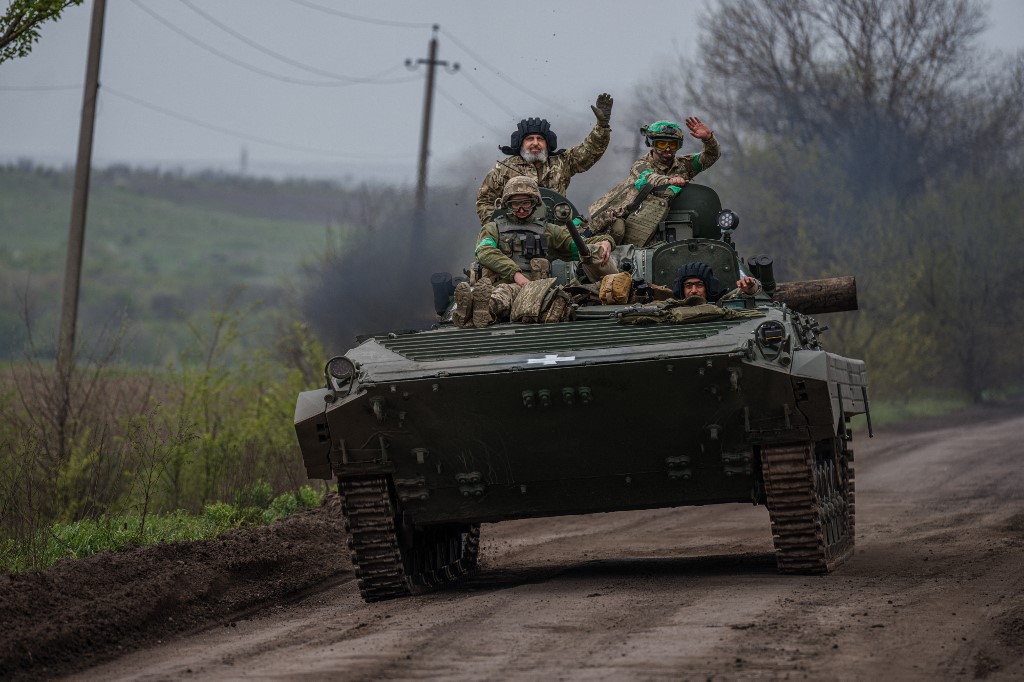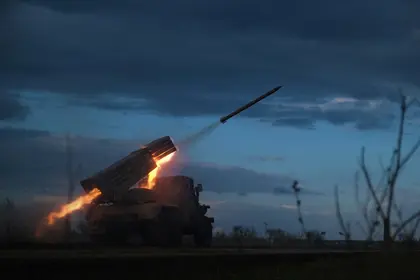Russia’s casualties in Ukraine appear to have dramatically declined by nearly 30% in April, according to Ukrainian government data analyzed by Kyiv Post.
Publicly released figures by the Ukrainian Ministry of Defense current to April 30 show that 16,970 Russian troops died this month as part of Russia’s full-scale invasion of Ukraine.
JOIN US ON TELEGRAM
Follow our coverage of the war on the @Kyivpost_official.
April’s Russian casualties in Ukraine compare to the following Russian casualties in the previous months of 2023:
| Month | Total Russian casualties (KIA) | Percentage change from previous month |
| January | 21700 | +25% |
| February | 21470 | -1% |
| March | 24100 | +12% |
| April | 16970 | -29.6% |
Even with the decrease in Russian casualties in Ukraine in April, the figure is nevertheless higher than for any month in 2022. This illustrates 2023 has been significantly bloodier for Russia than 2022 on the battlefields of Ukraine.
The average monthly Russian casualties in 2022 was 9,274 per month. The average monthly Russian casualties in 2023 thus far is 20,948 – or more than double the previous year’s average.
Losing nearly 21,000 troops per month is the equivalent to losing more than four battalions or more than two divisions in military organisation terms.
Notable losses in February include the decimation of elite Russian Marine units backed by Moscow’s latest tanks in futile attacks in the eastern Vuhledar sector.
March 2023, which saw a massive increase in the intensity of fighting at Bakhmut, was – with 24,100 KIA - the highest month on record for Russian casualties in Ukraine, according to Ukraine’s official figures.

Russia Claims Capture of Two More East Ukraine Villages
The April decrease in Russian casualties in Ukraine may be explained by several reasons, such as different battlefield tactics employed by the Russian Federation.
The undertrained, released convicts used by the PMC Wagner Group, for example, in Bakhmut and elsewhere accounted for particular high Russian casualties. These forces have been more recently replaced by better trained and better equipped Russian regulars, including special forces.

An advertising screen promoting private mercenary group Wagner sits on a building in Moscow on April 17, 2023. The slogan reads "Together we will win!". PHOTO: AFP
Prisoners of War from the Russian mercenary Wagner Group, one of the hardest-attacking Russian units in theater, told Kyiv Post in a series of March interviews at least half of soldiers in their unit were killed in a typical attack, and sometimes 70- 80 percent died.
Frequently, men hit in combat receive no immediate first aid, and sometimes have to wait for hours before a casualty assistance team reaches them, they said.
Russian casualty figures in Ukraine are difficult to definitively establish, including because Russian authorities generally neither release nor confirm figures.
On May 1, Serhii Cherevatyi, spokesman for the Eastern Grouping of the Armed Forces of Ukraine, told Ukrinform that “the occupiers lose about 100 soldiers every day in the Bakhmut sector”. He did not specify whether that 100 are deaths alone or dead and wounded personnel combined.
If the spokesman’s figure of 100 is accurate, it can cast doubt on the accuracy of overall publicly released Ukrainian figures – which averaged over 500 Russian deaths per day in April alone – when Bakhmut is by far the most active theatre of war.
The most recent international estimate came from the White House on May 2, which said Russia has lost 100,000 troops over the last five months for no significant strategic gains.

Ukrainian servicemen ride in a BMP infantry fighting vehicle near the town of Bakhmut, in the Donetsk region, on April 28. PHOTO: AFP
Norway’s chief of defense, General Eirik Kristoffersen, told the New York Times in February that there is “much uncertainty regarding these numbers, as no one at the moment is able to give a good overview. They could be both lower or even higher.”
Figures of Russian casualties in Ukraine made by the Ukrainian military do not align with figures contained in a recent purported leak of an assessment collated by the U.S. Defence Intelligence Agency. That document stated that Russia has suffered 35,500 to 43,000 killed in action and 154,000 to 180,000 wounded.
Those same leaks, suggested Ukraine has suffered 124,500-131,000 total casualties, including 15,500-17,500 killed in action and 109,000-113,500 wounded in action, according to a slide entitled "Russia/Ukraine - Assessed Combat Sustainability and Attrition."
Ukrainian surgeons and combat medics said the AFU’s ability to keep wounded soldiers alive and stable until they reach top-notch hospital care – particularly for the first 60 minutes following injury, called by combat medics the “Golden Hour” – is orders of magnitude superior to the Russian army’s.
In the Ukrainian military, with four out of five casualties receiving high quality first aid within minutes of being hit and, if needed. evacuation to a fully-equipped hospital with specialized surgeons in eight hours or less.
Despite the uncertainty in the numbers, the downturn in the Ukrainians’ own figures of Russian casualties – if taken by magnitude alone – confirms that combat activity changed over April.
Behind the bigger picture of the overall Russian casualty numbers in Ukraine, there are important nuances, including higher numbers of Russian casualties during the summer ‘fighting season’ and among specific types of Russian units.
For example, another recent US intelligence leak points out the high concentration of Russian casualties among Russia’s special forces units, which are known as ‘spetsnaz’.
As reported by Al Jazeera, the US assessment of Russian casualties among ‘spetsnaz’ units was based on before and after satellite images. These revealed that “all but one of five Russian Separate Spetsnaz Brigades that returned from combat operations in Ukraine in late summer 2022 suffered significant losses”.
Up to 775 Russian troops from one ‘spetsnaz’ brigade of 900 total troops are reportedly dead, according to the US intelligence leak.
In a March blog for Lawfare, Seth G. Jones, Vice President at the Center for Strategic and International Studies (CSAS) wrote that “Russia has suffered more combat fatalities in Ukraine in the first year of the war than in all of its wars since World War II combined.”
“In addition, the average rate of Russian regular and irregular soldiers killed per month in Ukraine over the first year of the war was at least 25 times the number killed per month in Russia’s war in Chechnya and at least 35 times the number killed per month in the Soviet Union’s war in Afghanistan,” Jones added.
You can also highlight the text and press Ctrl + Enter






